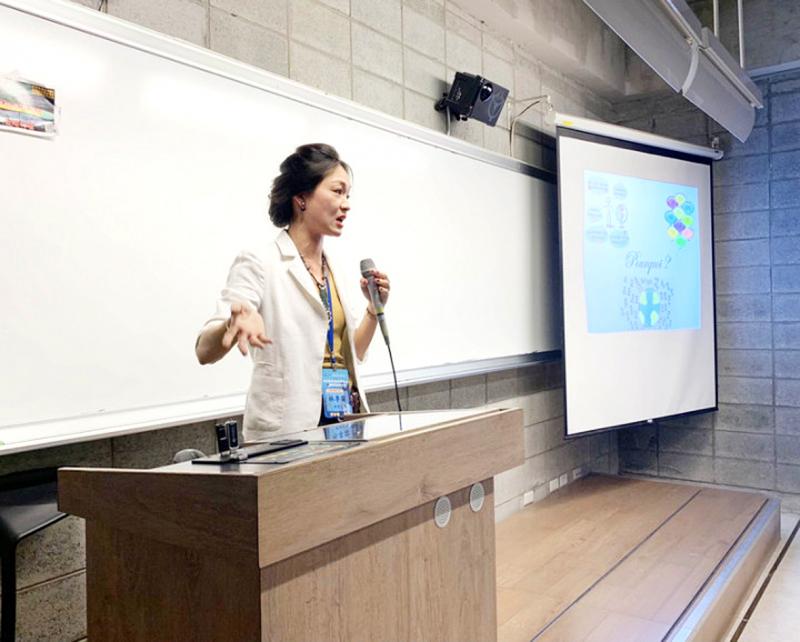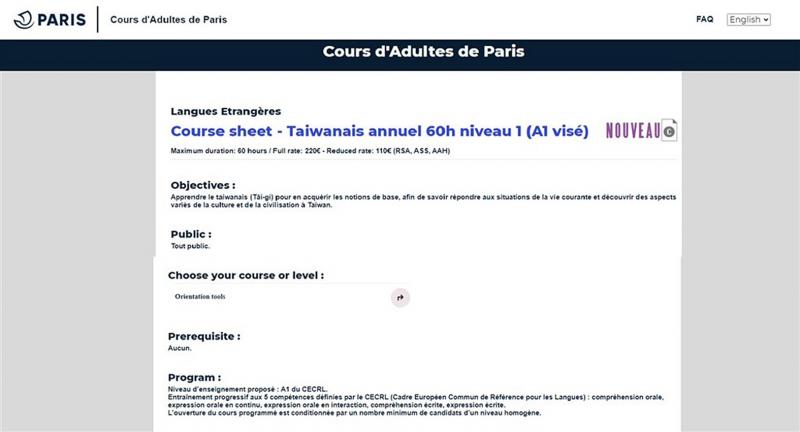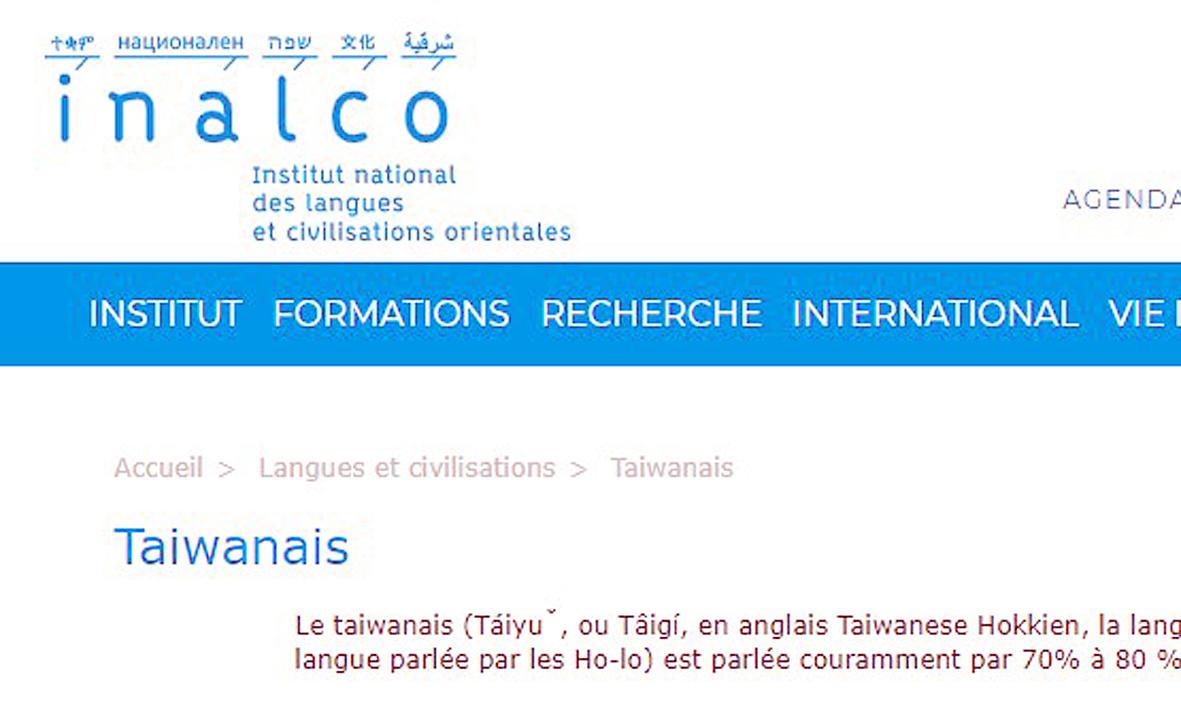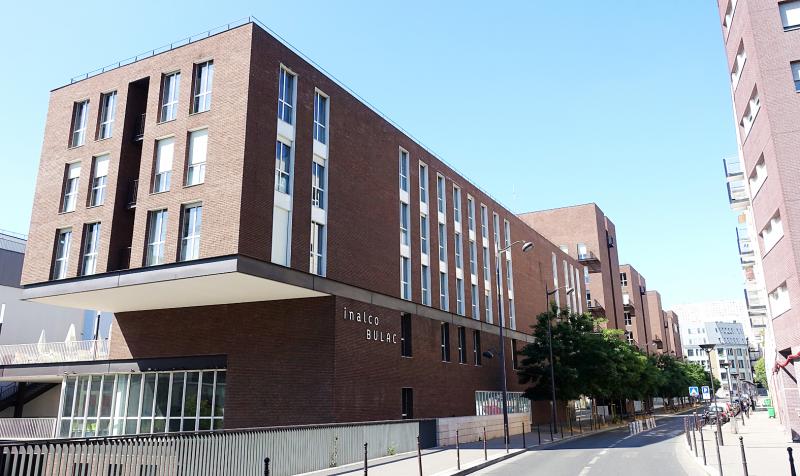Miao Lin-Zucker (林季苗) wanted to teach Taiwanese how to speak French; instead she’s helping the French learn Hoklo (also known as Taiwanese).
As of last week, nearly 120 people had expressed interest in the first ever Hoklo classes (listed as Taiwanais in French) offered by Les Cours d’Adultes de Paris, one of the largest public language learning institutions in France. The courses begin online next month.
“It’s getting easier to explain Taiwan to people here due to its recent international visibility,” Lin-Zucker says. “So it doesn’t seem as strange anymore to promote a Taiwanese Hoklo class. I’m not training language experts here, I just want this language to keep being used.”

Photo: CNA
Lin-Zucker, an associate professor in the foreign language department at the University of Lyon, says she was inspired by the popularity of the Taiwanese Hoklo classes offered as electives for the first time last year at National Institute for Oriental Languages and Civilizations (INALCO). More than 70 students signed up for the first semester, which despite being held online, featured karaoke contests and poetry readings.
“As long as there is interest, the government is willing to give the classes a try,” Lin-Zucker says. “We didn’t really talk about politics, the discussion was mostly about linguistics and education. Surprisingly, I didn’t face any pushback.”
COURSE OFFERINGS

Photo: CNA
Lin-Zucker was finishing her master’s studies in teaching French as a foreign language when the Mandarin-learning craze took off with the rapid rise of China during the 2000s. She switched gears and finished her program focusing on teaching Mandarin.
Over the years, she felt an urge to do something for Hoklo, her mother language, especially in light of the decline in usage among young people in Taiwan.
“Many Taiwanese can freely converse with foreigners in their respective languages, but they cannot use Hoklo to talk to their elderly neighbors,” she says.

Photo: Screen grab
Lin-Zucker hopes to find out more about her French students’ motivations after classes start, but she believes that the interest is due to Taiwan’s raised and largely positive international profile, featuring values that align more with other democratic nations.
Liu Chan-yueh (劉展岳), who teaches the Hoklo classes at INALCO, will also lead the classes at Les Cours d’Adultes de Paris. Originally a Mandarin teacher at the institute, he says that the opportunity to offer Taiwanese Hoklo as an elective opened up after the departure of the Chinese department’s Cantonese teacher.
Liu says there was much debate over whether to call it Minnan or Taiwanais, but he insisted that the differences between the two were large enough, especially if the instructor hails from Taiwan.

Photo courtesy of Wikimedia Commons
Lin-Zucker says she simply describes it as the second-most spoken language in Taiwan.
“We don’t want to become too deliberate when promoting the nation,” she says. “The description is quite neutral, and if someone is interested in Taiwan and wants to dive deeper, they can sign up.”
PRACTICAL TONGUE?
Like Lin-Zucker, Liu says that awareness of Taiwan in France has grown significantly in recent years. Compared to 10 years ago when he had to keep explaining the difference between Taiwan and Thailand, he says he did not need to do much clarification when promoting the new class.
Liu says due to scholarships offered by the Taiwanese government, many of INALCO’s students have been to Taiwan or plan to visit, which boosted interest in learning its second-most spoken language. Returning anthropology or sociology students also noted that knowing Hoklo makes a significant difference especially when doing field research in the south, or with older people.
“We also have four teachers from Taiwan, and if they enjoy our classes they might also become interested in our mother tongue,” Liu says.
However, the practicality of Hoklo is a lingering question, as the casual visitor to Taiwan can easily get by with Mandarin or, in many cases, English. Lin-Zucker says there doesn’t always need to be a practical reason for a language to become a trend — the French, for example, were quite fervent in learning Mandarin in the 60s and 70s, before it was economically beneficial to do so.
“We also have to depend on Taiwan’s young people to try using the language more, so that there are more practical avenues to use it regularly,” she adds.
Liu says that the “usefulness” of a language should also not be seen as black and white.
“Something that’s not practical now doesn’t mean it’s useless, one just doesn’t have the opportunity to use it yet,” he says. “Many people come to Taiwan then find out that Mandarin isn’t enough for what they want to do. This notion should be strengthened — how should Taiwanese society create more opportunities and mechanisms for foreigners to use Hoklo?”

That US assistance was a model for Taiwan’s spectacular development success was early recognized by policymakers and analysts. In a report to the US Congress for the fiscal year 1962, former President John F. Kennedy noted Taiwan’s “rapid economic growth,” was “producing a substantial net gain in living.” Kennedy had a stake in Taiwan’s achievements and the US’ official development assistance (ODA) in general: In September 1961, his entreaty to make the 1960s a “decade of development,” and an accompanying proposal for dedicated legislation to this end, had been formalized by congressional passage of the Foreign Assistance Act. Two

Despite the intense sunshine, we were hardly breaking a sweat as we cruised along the flat, dedicated bike lane, well protected from the heat by a canopy of trees. The electric assist on the bikes likely made a difference, too. Far removed from the bustle and noise of the Taichung traffic, we admired the serene rural scenery, making our way over rivers, alongside rice paddies and through pear orchards. Our route for the day covered two bike paths that connect in Fengyuan District (豐原) and are best done together. The Hou-Feng Bike Path (后豐鐵馬道) runs southward from Houli District (后里) while the

March 31 to April 6 On May 13, 1950, National Taiwan University Hospital otolaryngologist Su You-peng (蘇友鵬) was summoned to the director’s office. He thought someone had complained about him practicing the violin at night, but when he entered the room, he knew something was terribly wrong. He saw several burly men who appeared to be government secret agents, and three other resident doctors: internist Hsu Chiang (許強), dermatologist Hu Pao-chen (胡寶珍) and ophthalmologist Hu Hsin-lin (胡鑫麟). They were handcuffed, herded onto two jeeps and taken to the Secrecy Bureau (保密局) for questioning. Su was still in his doctor’s robes at

Mirror mirror on the wall, what’s the fairest Disney live-action remake of them all? Wait, mirror. Hold on a second. Maybe choosing from the likes of Alice in Wonderland (2010), Mulan (2020) and The Lion King (2019) isn’t such a good idea. Mirror, on second thought, what’s on Netflix? Even the most devoted fans would have to acknowledge that these have not been the most illustrious illustrations of Disney magic. At their best (Pete’s Dragon? Cinderella?) they breathe life into old classics that could use a little updating. At their worst, well, blue Will Smith. Given the rapacious rate of remakes in modern